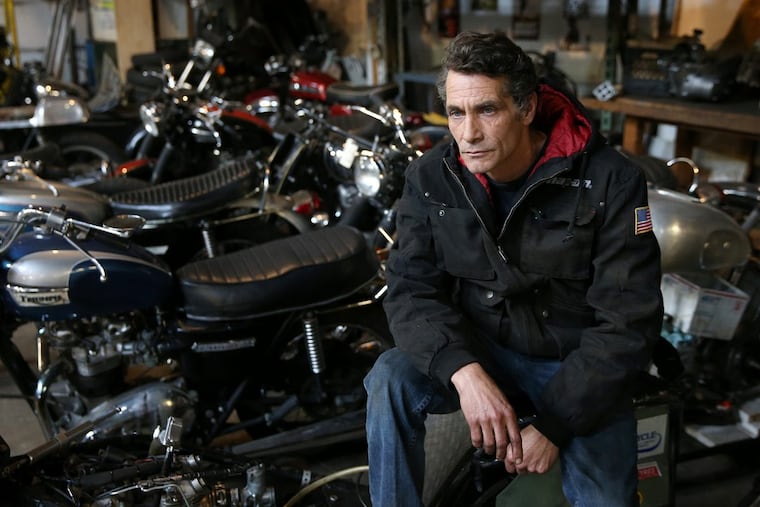From 'white ghetto' to 'finely milled grit': How a longtime Fishtowner has watched his neighborhood evolve
"Fishtown's definitely at full capacity as far as yoga and nail places go," Adam Cramer said.

When he turned 17, Adam Cramer moved from his family's home in Wyndmoor to a warehouse in Fishtown, drawn by cheap rent and the allure of a renegade artistic community.
Gunfire was frequently heard in the hallways of his building, drug addicts broke into his motorcycle shop to steal parts, and even the parties circa 1989 usually ended in fist fights.
"I was a street urchin and it was the white ghetto. Warehouses were like tent cities. It was like a giant apocalyptic party," Cramer said from his shop, Liberty Vintage, on Sepviva Street.
Three decades later, Cramer, 48, restores bikes in his garage across from a bucolic little park in a reborn Fishtown that sprouts wine bars, doggie day cares and emporiums peddling succulent plants. He and his wife are raising their 13-year-old son next door on a block of rowhouses, mostly filled with families.
Fishtown is still gritty, Cramer says. It's just a finely milled grit.
"It used to be, a neck tattoo around here meant — oh don't [mess] with that guy," Cramer said. "Now you see a neck tattoo, they want to read you a poem about their vegan bicycle."
Cramer isn't against the changes. Far from it, he wants to benefit from being here through the renaissance. He says he turns down dozens of requests a month, mostly from New York City developers, wanting to buy his warehouse.
Instead, he decided recently to slice the shop in half. He's looking to bring in a local business to rent part of the space and cut his costs. On Sunday he posted on the Fishtown Facebook group asking neighbors what they wanted to see added to the area and whether they knew any businesses looking for a home.
Ideas flowed in: independent movie theater, antiques warehouse, music space, sculpture gym, flea market, tool library.
Cramer has a few criteria of his own — it has to be a business his wife, an architect, approves of, and he'd love one whose clientele might appreciate his massive collection of vintage bikes.
"Fishtown's definitely at full capacity as far as yoga and nail places go," he said.
Cramer grew up lower-middle class, but his father, a paper broker who made bags for Strawbridge & Clothier and Gimbels, scrounged enough to send him to Chestnut Hill Academy, an odd fit for a teenager lusting after the open road.
He has been restoring all makes and models of motorcycles since before he could legally drive them, specializing in the classic British bikes.
His mechanical know-how and penchant for salty one-liners grabbed the attention of the Discovery Channel, which aired a reality TV show, Philly Throttle, about the shop and the character who ran it, in 2013.
The series lasted one season. Cramer quit. He said producers had started meddling too much in his life. After one particularly frustrating day, he chased the film crew out with a garden hose on full blast.
"It just didn't work out," Cramer said.
He sees his warehouse — a former loading dock for a tomato processing factory — as more than a place to fix bikes. It's a motorcycle museum with a blue-and-white helicopter and a 1969 Jaguar XKE hanging from the ceiling. He's got about 300 bikes, including Triumphs, Nortons, and a 1935 DKW German motorcycle. The garage is also a gathering space. On the first Friday of most warm-weather months, he brings in a live band and a few kegs of beer and hosts a couple hundred people from the neighborhood. Two days a week he teaches local kids about mechanics, through a mentorship program with an alternative high school in Norris Square.
"Philadelphia was — was — 100 years ago the biggest manufacturing city in the country," Cramer said. "We have people still here that know how to do this. The problem is there's not a vehicle to pass down their insight. There's no replacement for learning from some dude that's only got three fingers on his left hand."
On Monday afternoon, a classical music station blasted from an upstairs radio as Cramer tinkered with different parts. He used to be a death-metal guy but now he listens to Wagner. "I just don't hate that much anymore," he said. He finds classical calming but complicated, like motorcycle repair.
As he worked, people filtered in and out. A harpsichord manufacturer from Bethlehem, who knew his bike was far from complete, stopped by to check on it anyway. A friend rode in from Somerset, Pa., because it was his day off from work and he felt like chatting. An antiques dealer who saw the Facebook ad came by to scope out the space.
It was an eclectic group for a self-styled "dirty motorcycle guy."
"Fishtown was tough when I needed it to be," Cramer said. "Other places didn't want greasy, dirty motorcycle guys around. We were hard living, but I've matured with the neighborhood."